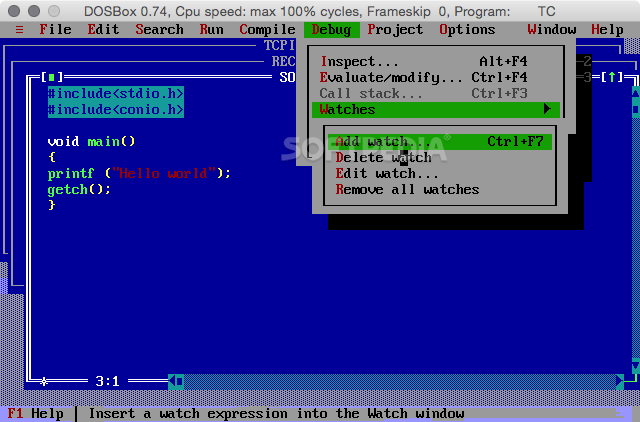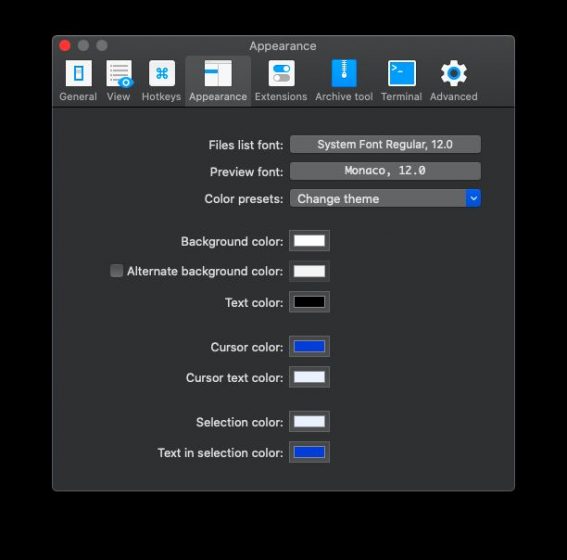
- CONIO.H ALTERNATIVE FOR MAC SOFTWARE
- CONIO.H ALTERNATIVE FOR MAC CODE
- CONIO.H ALTERNATIVE FOR MAC ISO
- CONIO.H ALTERNATIVE FOR MAC WINDOWS
CONIO.H ALTERNATIVE FOR MAC CODE
It takes quite the effort to have even a relatively small piece of c/c++ code running on both platforms. This is called cross-compiling and any search on google with this keyword will give you adequate results.
CONIO.H ALTERNATIVE FOR MAC WINDOWS
o file but can we use it to output exe that can be run on windows ? Is it possible to create binaries for other platform on Linux? Is it possible to create binaries of other platform on Linux? Say I have a program that can be compiled using gcc to. You'll want or if you want I/O routines/settings that don't normally exist under Linux (or the other *NICES). Most of the usual I/O routines are in, even setvbuf() which is pretty low-level control. Depending upon your compiler installation and build environment, you'll probably want instead. MinGW provides a set of tools, but uses the microsoft c-runtime, so things like pthreads should be missing.Ĭygwin is a far more conformant POSIX build environment.įor the benefit of posterity, is the BSD version of low-level file I/O routines.

If your application sticks to the C standard library for things like file IO, Dev Studio should support most of that natively. There are a few build environments that you can use to port linux/unix applications to Windows. I don't know what functionality is in, it looks like its part of the POSIX standard header files, but I can't find a reference to it in the posix sources. If you are porting to windows, it would be far easier to stick to cross platform standards, than diving straight into a native windows Api port (ala CreateFile). What functions are you trying to convert? It'll probably be a case of using a different function on WIN32 it is very different to Linux/Unix/POSIX.Įxample: the ReadFile() function is roughly equivalent to read() in terms of general idea, but the calling signatures are very different. If you need to cut down on some of those includes, #define WIN32_LEAN_AND_MEAN will wipe out some of the more obscure things from the Windows libraries. When writing WIN32API apps you usually #include - that includes most of the Windows API in your application.
CONIO.H ALTERNATIVE FOR MAC SOFTWARE
GitHub is home to over 40 million developers working together to host and review code, manage projects, and build software together.Windows equivalent - linux Is there a Win32 equivalent to the linux header file? I'm working on a Linux to Windows port (and my first time doing so) and it's failing on this file. Join GitHub today Biblioteca Conio H Dev C Online A good start is to Google for 'man curses'. Nothing platform-specific is particularly convenient, but if you wish to do both Windows and *nix then I recommend you to the NCurses library.įor use on POSIX platforms (like Ubuntu): NCursesīoth are highly compatible and, unless you are doing something the documentation says is specific to one or the other, they should work identically.īe sure to look around for good documentation too. But still there are certain substitute which may be. Hence, you cannot include conio.h in DevC. ‘conio.h' is included in MSDOS compilers but not in gcc/g. DevCpp IDE for C/C has gcc/g compiler version which do not have conio.h header file. GitHub is home to over 40 million developers working together to host and review code, manage projects, and build software together. This header declares several useful library functions for performing 'console input and output' from a p.
CONIO.H ALTERNATIVE FOR MAC ISO
It is not part of the C standard library or ISO C. Conio.h is a C header file used mostly by MS-DOS compilers to provide console input/output.


The #include h will give you almost all the functionalities that was provided in conio.h. Compilers that targeted non-DOS operating systems, such as Linux, Win32 and OS/2, provided different implementations of these functions. Read the README file and have fun! Conio.h is a C header file used in old MS-DOS compilers to create text user interfaces. It work on windows and linux, and use the Borland Style Conio2.h code. With this implementation, you can use the programs writed with the conio.h in windows and linux, using the ncurses for linux to simulate the conio.h functions.

This header declares several useful library functions for performing 'console input and output' from a program. It is not part of the C standard library or ISO C, nor it is defined by POSIX.


 0 kommentar(er)
0 kommentar(er)
